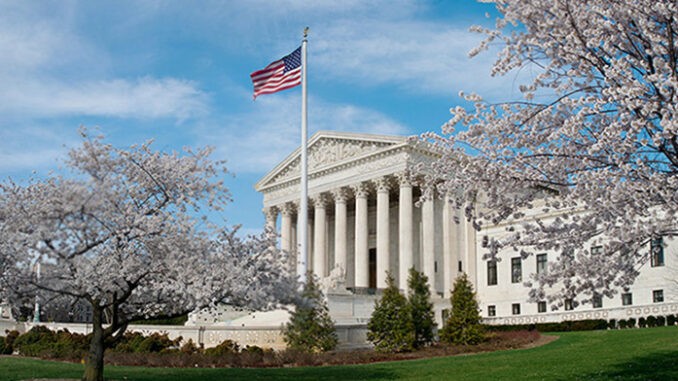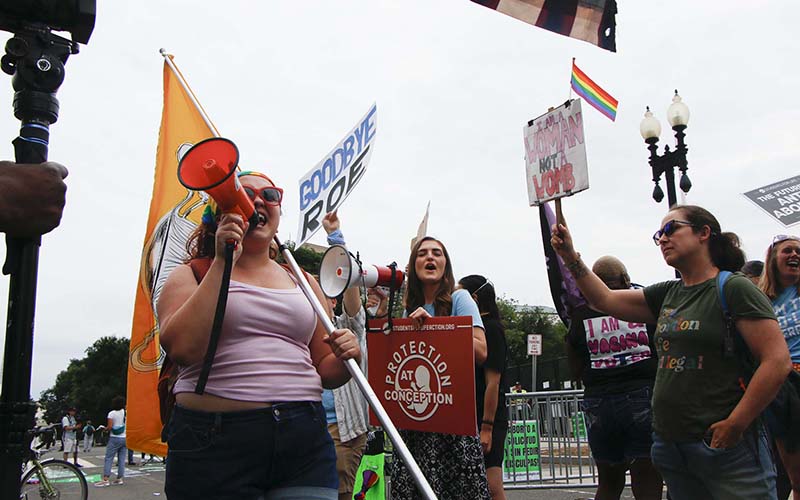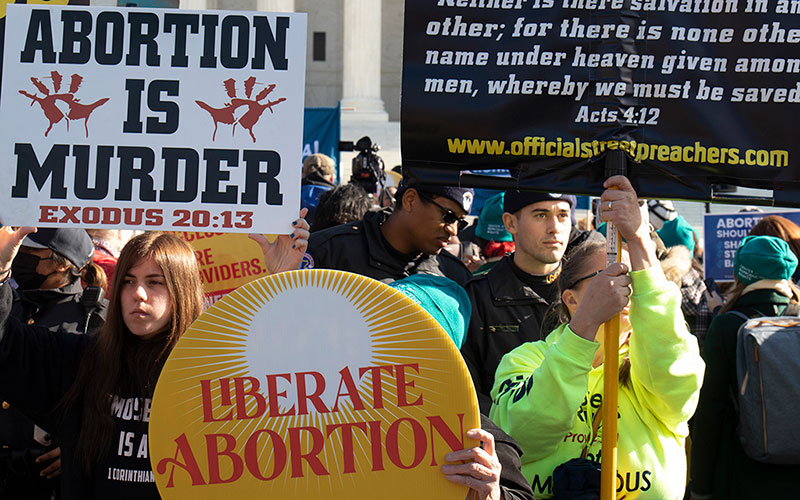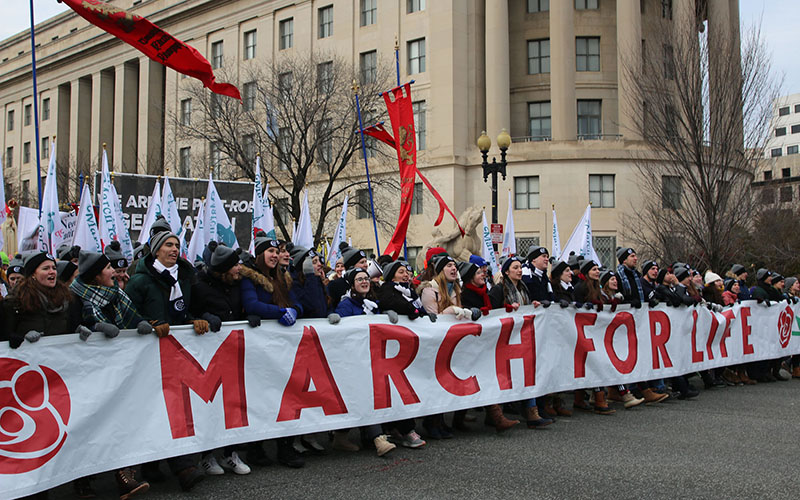[ad_1]

By Tracy Abiaka
WASHINGTON – The Supreme Court is expected to hand down a ruling restricting or overturning abortion rights within a matter of days, but Phoenix Dr. DeShawn Taylor has been getting ready for months.
“I’ve been doing this since the Supreme Court took up the case to begin with because in my mind, I felt that, why would the Supreme Court take up the case (if) they weren’t going to seriously consider overturning Roe V. Wade,” Taylor said, referring to the Supreme Court’s 1973 decision that recognized a right to an abortion.
A ruling overturning Roe could come as early as Thursday, when the court could release its decision in Dobbs v. Jackson Women’s Health Organization, a case challenging Mississippi’s law that prohibits most abortions after 15 weeks of pregnancy.
A leaked draft of the Dobbs ruling in May appeared to show a majority of justices agreeing that Roe “must be overruled” because abortion is not protected under the Constitution. The court may ultimately back away from that position, but Taylor and other advocates are preparing for an outright ban on abortion.
“For my practice, overturning Roe V. Wade would basically stop availability of abortion care at this clinic,” said Taylor, a gynecologist who owns Desert Star Family Planning in Phoenix.
So she and other advocates have been building networks to educate and to provide reproductive services and resources – including the possibility of transporting patients other states where abortion may still be available.
The Guttmacher Institute identified Arizona as one of 20 states where abortion could be banned outright if the court overturns Roe. That’s because there’s a pre-Roe law on the books from 1901, when Arizona was still U.S. territory, that bans abortion except to save a woman’s life.
But the American Civil Liberties Union of Arizona said that’s not automatic: ACLU spokesperson Amanda Mollindo said the 1901 law was permanently enjoined in 1973 and it would take legal action to restore that law, which was enjoined by courts in 1973.
And Arizona passed a law this spring mimicking the Mississippi law: It would ban abortions after 15 weeks of pregnancy, with exceptions only in the case of a medical emergency for the mother. That measure, signed March 30 by Gov. Doug Ducey, could take effect this fall.
Cathi Herrod, president of the Center for Arizona Policy, an anti-abortion advocacy group, says her organization supports the 1901 law. She said the group is prepared to “defend the life issue in the courts and Arizona legislature” and would “oppose any efforts to enact abortion rights either through the courts, through ballot measures, or through the legislature.”
If abortion is banned in Arizona, anti-abortion advocates in the state said they will continue their work to “meet the needs of women who find themselves pregnant.” That includes nearly 50 pregnancy resource centers in Arizona that “stand ready to love both women and their unborn children,” Herrod said.
Maria Birnbaum, Arizona state director at Susan B. Anthony List, an anti-abortion adovcacy group, said that with the support of crisis pregnancy centers and state resources for families, women do not have to “choose to be homeless” but can get the resources needed to give birth.
She said the centers typically work with mothers for several years after birth, to provide “support, parenting classes, job training… It’s really amazing the different kinds of programs that exist here.”

The Supreme Court could merely restrict Roe v. Wade, its 1973 opinion that recognized a right to an abortion, but many think it could overturn Roe with its ruling this month in Dobbs v. Jackson Women’s Health. (Photo by Neetish Basnet/Cronkite News)
Abortion-rights advocates say those centers provide misinformation and do not give full options, including abortions, to pregnant people. They are putting their energies into continuing to make abortions accessible, even if that means helping “to shift people across state lines to get their care.”
The Guttmacher Institute estimates that the current driving distance to obtain an abortion in Arizona is 11 miles. That would rise to 250 miles if there was an abortion ban in the state.
Eloisa Lopez, executive director at Pro-Choice Arizona, said that building its network of volunteers and other abortion funds both regionally and locally “has been a priority for the organization over the past year.” Her organization runs the Abortion Fund of Arizona and Rural Access Project, which provides assistance to those seeking abortions in the state now.
“It’s a priority for us because the reality is many people will not be able to travel out of state if they do not have some sort of financial system to make it happen,” Lopez said.
Sarah Tarver-Wahlquist, a member of the Tucson Abortion Support Collective, said it is looking for ways it can shift focus post-Roe.
“It could look like managing transportation networks to get people out of the states to clinics in New Mexico, Colorado and California,” said Tarver-Wahlquist, whose group works with the Abortion Fund of Arizona. “It could look like funding, heavy fundraising because folks are going to be facing even more costs. Travel costs and everything on top of the cost of abortion itself.”
Elizabeth Nash, a state policy analyst for Guttmacher Institute, along with other advocates, say reversing Roe would have a more adverse effect on communities of color and lower-income individuals “who have been systemically oppressed and have less access to health care.”
“If you’re white and wealthier, you’ll be able to get an abortion,” Nash said. “You’ll be able to pull together the funds, and you’ll have an easier time navigating all these logistics and details and travel.”
Advocates fear that those without the resources might turn to other measures, such as self-source medication that can disguise an abortion as a miscarriage. Taylor said she is trying to determine how to respond if such a patient showed up in her clinic for care if things don’t go well in such a situation.
Taylor said she would “need to consult with legal counsel about the laws and level of risk that goes with certain types of activities around pregnancy, because I definitely have no interest in going to jail for trying to help people.”
But she wants to do whatever she can to continue helping people. Taylor said she is still taking appointments for abortion services, and will keep her practice open in the case of a ban because it provides “other care besides abortion care.”
“I felt it was important for the community to know that my clinic exists, that my clinic provides the full range of family planning services in terms of contraception that’s reversible as well as abortion care,” Taylor said.
[ad_2]
Source link



